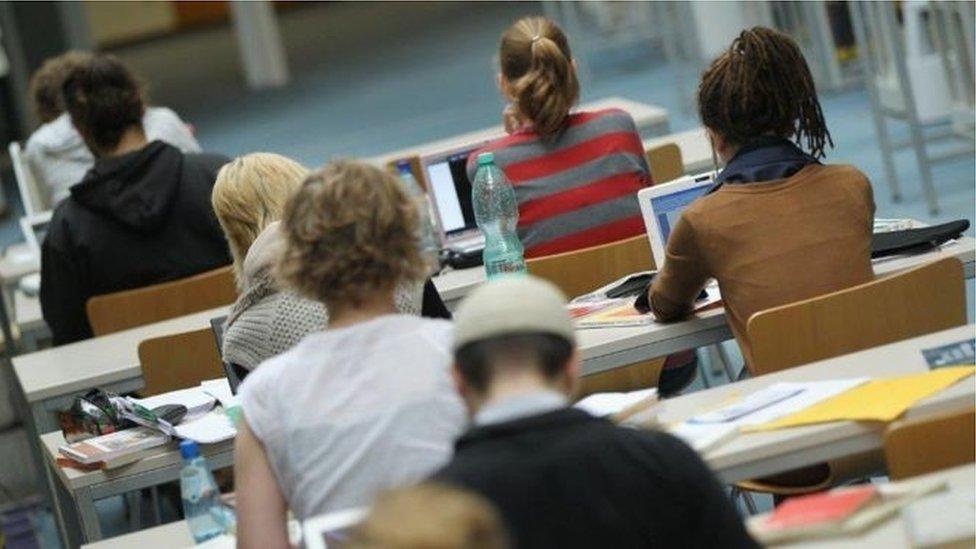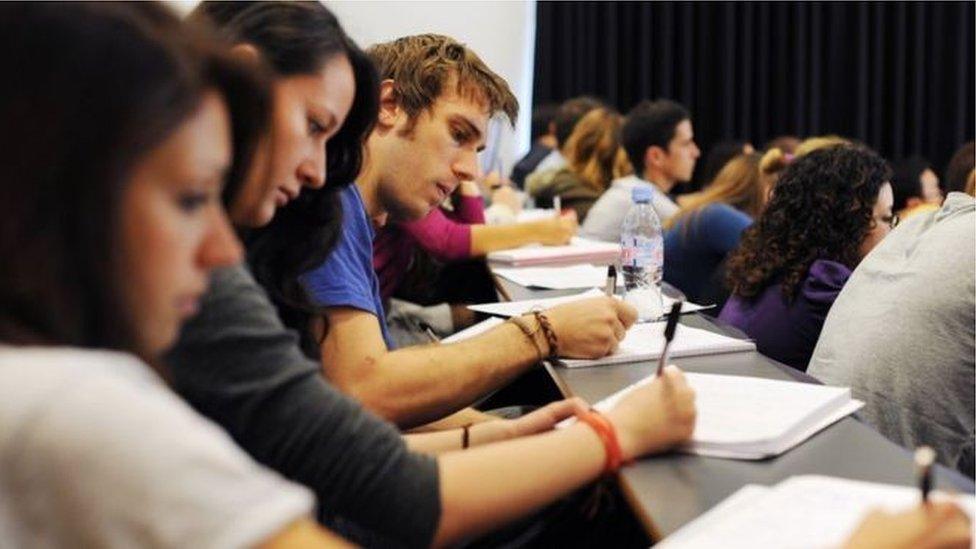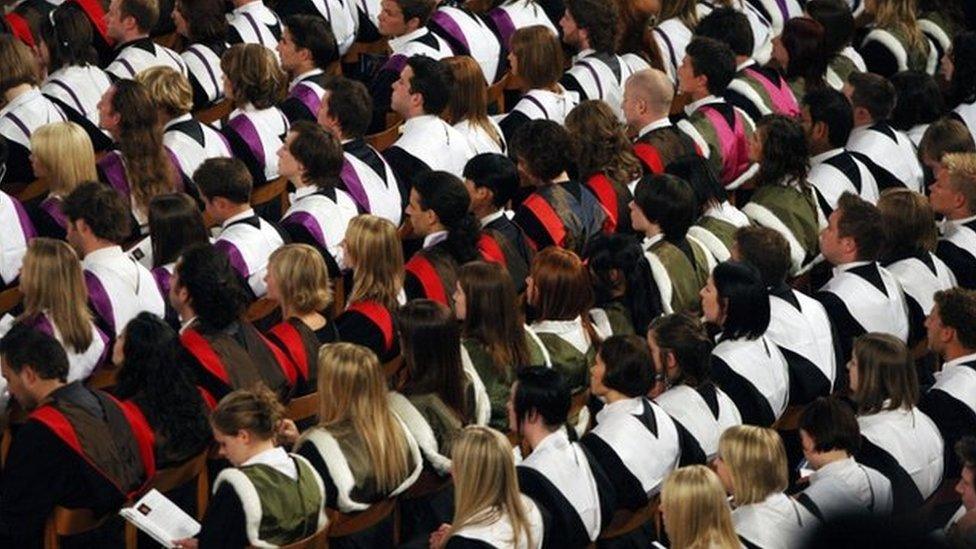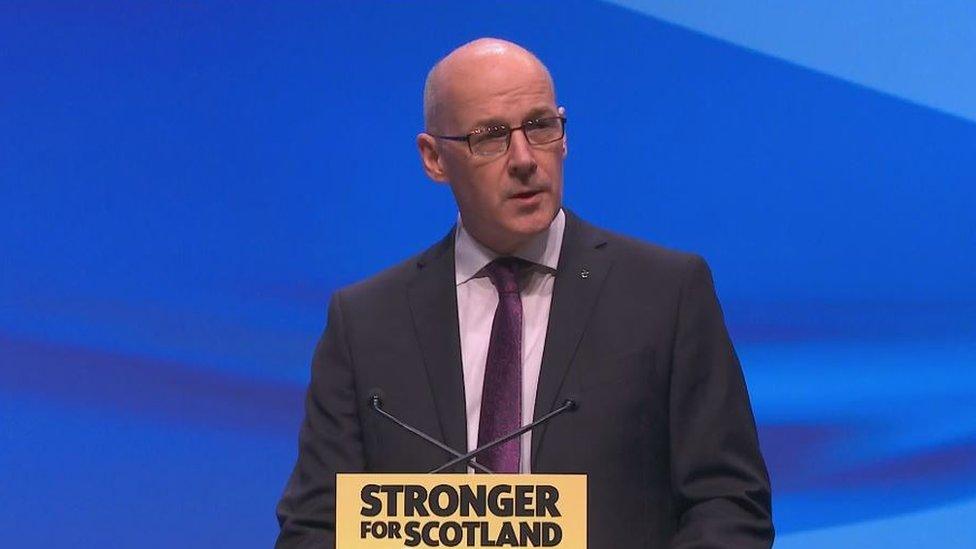Uncertainty over EU students in Scotland after Brexit
- Published

The Scottish government's decision that university students from EU countries who start their courses in 2018 will be able to complete their studies without paying tuition fees has been broadly welcomed.
Universities feared the uncertainty could put off applicants from the EU.
But will free tuition for EU students continue after Britain leaves the Union in 2019?
Scottish politicians will need to take a lot into account before deciding what to do.
The students in the spotlight are the 13,500 or so students from other EU countries who plan to study for the whole of their degree at a Scottish university - not exchange students here for a limited period of time as part of their course.
The Scottish government sees the abolition of tuition fees for Scottish university students as one of its proudest achievements.
Natural limit
Former first minister Alex Salmond famously said "the rocks would melt in the sun" before they would be charged fees.
European law means students from other EU countries also have to be able to access free tuition in Scotland in exactly the same way as Scots.
Free tuition for EU students was never an active aim of Scottish government policy - it was seen as the price worth paying for a policy which the government believed was right for Scots.
But it is still possible to charge tuition fees to students from England, Wales and Northern Ireland.

Essentially, this is because it is possible under European law to discriminate between students from different parts of one member state - in other words different parts of the UK - but not against people from other states.
Free tuition for students from other parts of the UK could have led to Scotland being swamped by students seeking to avoid fees but there is a natural limit on the number of students from further afield who would want to spend four years at university in an English-speaking country.
In practice, EU students compete against Scots for the same publicly-funded university places though, of course, the overwhelming majority of places go to Scots and the number of Scots at university is around its highest level.
Students from other parts of the UK and countries outside Europe pay tuition fees. Universities can decide for themselves how many to admit, essentially using the law of supply and demand.
International institutions
Scottish universities proudly see themselves as international institutions.
They are determined to ensure that EU students continue to feel welcomed and valued in Scotland after Brexit and many have practical concerns - for example over what rights EU students may have to work in Scotland or whether they can use public services after Brexit.
But on the narrow issue of free tuition, might new EU students start to be charged fees for courses which begin in 2019 and after?
The answer may well be a political calculation. Would it be politically acceptable to voluntarily provide free tuition to EU students while those from other parts of the UK are charged fees?

John Swinney announced the guarantee in a visit to the University of Dundee
If the Scottish government was trying to seek to maintain the closest possible links with the EU then it may conclude that free tuition was an appropriate use of its resources.
Similarly, if Scotland was on the path towards independence and hoped to rejoin the EU, then it is unlikely that the government would want to do anything which would need to be changed once Scotland actually rejoined.
But there are strong arguments the other way too.
If Scotland is not in the EU, would voluntarily providing free tuition to EU students be acceptable to the public? By implication, any EU student with a free place has a place which may otherwise have gone to a Scottish applicant.
Real worries
The Scottish government wants to help ensure that more youngsters from disadvantaged areas get to university.
Universities support the aim but warn that unless the total number of available places increases at a similar rate, it could become even harder for those Scots who are merely "not disadvantaged" to get in. Ending free EU tuition could help make more places available for Scots at no extra cost to the taxpayer.
Nobody in the mainstream would want to suggest that EU students are anything other than welcomed or valued by Scottish universities. The question would be whether it would be reasonable to charge them fees.
And if so, would they be charged on the same basis as students from other parts of the UK? Or would they pay the uncapped fees levied to students from countries outside Europe.
If students from other parts of the UK are charged fees, it could seem like active discrimination against them if EU students are being offered free tuition.
The Scottish government will need to decide at some point in the next year or so just what should happen in 2019. There are strong arguments to consider on both sides.
Meanwhile many real worries and practical uncertainties remain for current students from EU countries.
They know they will be able to complete their studies without being charged fees. But much still needs to be discussed and agreed about their position after Brexit or whether they would need a visa to work here after they graduate
- Published24 March 2017

- Published2 February 2017

- Published14 October 2016
